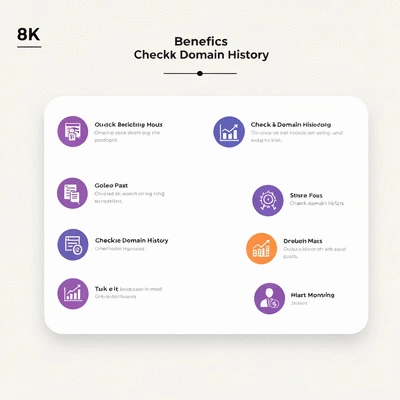Check Domain Ownership History Easily

Did you know that the history of a domain can significantly influence its SEO performance? Understanding how domain ownership history plays a role in your online strategy is crucial for cultivating a robust digital presence.
What You Will Learn
- Domain Reputation Matters: A domain's past can impact its trustworthiness and visibility in search engines.
- Legal Implications: Previous ownership can pose risks to your brand’s reputation and lead to potential legal issues.
- Identify Risks: Recognizing past penalties and spam associations can protect your current SEO efforts.
- Age and Authority: Older domains often carry more authority, which can positively affect search rankings.
The Pillars of Domain History's Impact
Understanding domain ownership history is critical for SEO, safeguarding your brand, and mitigating legal risks. The visual below highlights the three key areas where domain history plays a pivotal role. To learn more about selecting a domain for optimal performance, check out our guide on selecting a domain for SEO.
SEO Rankings & Authority
Domain reputation, age, and past penalties significantly influence search engine visibility and trust.
- ✓ Domain Reputation
- ✓ Impact of Domain Age
- ✖ Past Penalties/Spam
Brand Reputation & Trust
Previous ownership and associated practices can either build or tarnish your brand's digital image.
- ✓ Positive Legacy
- ✖ Negative Associations
- ✓ Consumer Perception
Legal Considerations & Risks
Understanding past ownership helps in avoiding copyright, trademark, and other legal entanglements.
- ✓ Due Diligence
- ✖ Trademark Conflicts
- ✖ Infringement Issues
Understanding Domain Ownership History and Its Importance for SEO
When it comes to building a successful online presence, understanding domain ownership history is crucial. As a digital marketing strategist at Authority Assets & Digital Real Estate, I've seen firsthand how domain history can significantly impact your SEO strategy. It’s not just about choosing a catchy name; it’s about ensuring that name has a solid foundation to help you rise in the rankings.
In this section, we’ll explore why domain history matters, the legal implications it carries, and how it can either elevate or jeopardize your brand's reputation in the digital landscape.
Why Domain History Matters for Your SEO Strategy
First and foremost, let's talk about the role of domain reputation in SEO rankings. When search engines evaluate websites, they consider the history of the domain, including any previous penalties or spam issues associated with it. Understanding this history can give you a significant advantage when crafting your digital strategy.
- Reputation and Trust: A well-regarded domain can enhance your site's visibility.
- Past Penalties: Domains with a history of penalties may struggle to regain their ranking potential.
- SEO Value: An older domain often carries more authority, impacting its ranking positively.
By assessing the reputation and history of a domain, you can mitigate risks and optimize your SEO strategy effectively. With that said, it’s essential to delve deeper into identifying potential risks such as previous penalties and spam issues.
The Role of Domain Reputation in SEO Rankings
Domain reputation plays a significant role in how search engines perceive your site. A strong reputation can lead to higher rankings, while a tarnished reputation can push you down in search results. Think of it as the difference between walking into a café with great reviews versus one with a history of complaints. Your domain's past can shape potential visitors' perceptions and influence their decision to trust your content.
Moreover, a domain with a positive reputation is likely to attract more backlinks, which is another essential factor for SEO success. This creates a snowball effect, boosting your site’s authority and visibility in search engines!
Identifying Risks: Previous Penalties and Spam Issues
Before you purchase or invest in a domain, it’s crucial to identify any previous penalties or spam issues that might plague it. This includes understanding if the domain has been associated with black-hat SEO tactics or has a history of malware. Such problems can severely affect your new website’s credibility and ranking potential.
- Check for any Google penalties or manual actions.
- Investigate past ownership and their SEO practices.
- Look for spammy backlinks that could harm your current SEO efforts.
Identifying these risks can save you time, effort, and resources in the long run, allowing you to focus on building a strong online presence instead of scrambling to rectify past mistakes. For further insights into establishing credibility, consider learning about topical authority in SEO.
The Impact of Domain Age on Ranking Potential
Another important aspect to consider is the impact of domain age on ranking potential. Generally, older domains are viewed as more trustworthy and authoritative, which can contribute positively to their SEO rankings. This is where the concept of "digital real estate" comes into play — older domains typically command more value due to their established presence.
However, it's essential to combine this age factor with other SEO metrics. An older domain without quality content or backlinks won't automatically rank higher. Instead, it's a combination of age, credibility, and the quality of content that will help you climb the search engine ladder.
Legal Considerations: Protecting Your Brand Through Domain History
As you navigate the digital landscape, it's also vital to understand the legal implications tied to domain ownership history. Past ownership can influence your brand reputation, and it’s crucial to approach this carefully.
When you delve into domain history, you may uncover past issues that could pose legal risks or negatively affect your brand image. Let’s explore how previous ownership can impact your brand and what legal risks you should consider before making a purchase.
How Past Ownership Can Affect Brand Reputation
Previous ownership can leave an indelible mark on a domain’s reputation. For instance, if the prior owner engaged in spammy practices or was involved in controversies, that history can taint your brand. Consumers might associate your business with the negative actions of past owners, which could deter them from engaging with your content or services.
To safeguard your brand, it’s crucial to research the domain's history thoroughly. This proactive step helps you avoid inheriting any negative connotations that could harm your online reputation.

Legal Risks Associated with Purchasing Domains
Lastly, let’s address the legal risks that come with purchasing a domain. If a domain was previously registered by someone who had issues with copyright infringement, trademark violations, or other legal entanglements, you might find yourself facing similar challenges. This means you need to conduct diligent research to ensure you’re not buying a domain that could expose you to legal repercussions.
- Conduct thorough due diligence on past ownership.
- Review any potential trademark conflicts.
- Consult with a legal expert if you're unsure about the domain's history.
Following these steps will help shield your brand from potential pitfalls, allowing you to focus on establishing a strong and positive online presence. For more on how domain age can influence authority, read our article on domain age and SEO authority.
Frequently Asked Questions (FAQs)
Why is domain ownership history important for SEO?
How can previous penalties or spam issues impact my domain?
Does domain age affect SEO rankings?
What legal risks are associated with purchasing a domain with a checkered past?
What tools can help me check a domain's ownership history?
Pro Tip
Before purchasing a domain, take a moment to check its previous ownership history using tools like WHOIS and domain analyzers. This can help you uncover any potential red flags, such as prior penalties or spam associations, that could impact your SEO strategy and brand reputation.
Summarizing the Benefits of Checking Domain Ownership History
Understanding domain ownership history is crucial for anyone looking to establish a solid online presence. At Authority Assets & Digital Real Estate, we firmly believe that a thorough examination of domain history can significantly enhance your SEO strategy. By scrutinizing the past of a domain, you can unlock insights that not only influence current rankings but also safeguard your brand's reputation.
The connection between domain history and SEO benefits can't be overstated. For instance, a domain with a clean, reputable history can provide a strong foundation for your digital marketing efforts. On the other hand, domains with a tainted past—like previous spam issues or penalties—can hinder your success. This is why checking domain ownership history is an essential practice for any business.

Key Takeaways on Domain History and SEO Benefits
- Domain Age Matters: Older domains often carry more authority and trust, positively impacting your SEO rankings.
- Legal Safeguards: Understanding a domain's history helps prevent potential legal issues related to brand reputation.
- Reputation Management: Identifying and addressing past issues can restore trust and improve your online standing.
By recognizing these factors, businesses can make informed decisions when selecting domains, ensuring that they invest in assets that will benefit their long-term strategy. This is a key aspect of nurturing high-value clients at Authority Assets & Digital Real Estate.
Understanding the Connection Between History and Ranking Potential
When evaluating a domain's potential, it's important to remember that its history directly influences its ranking capabilities. For example, a domain that has been previously owned by reputable businesses is often viewed more favorably by search engines. By investing in a domain with a strong past, you can harness its built-up authority to boost your visibility online.
Moreover, understanding a domain's backlink profile is integral to this process. Analyzing past links can reveal whether they contribute positively to your site or pose risks that could harm your rankings. By utilizing tools such as Google Search Console alongside other domain analyzers, you can paint a clearer picture of how a domain's history will impact your SEO.
Recognizing Legal and Reputation Risks in Domain Ownership
Legal implications are a significant consideration when checking domain ownership history. As I’ve seen in my work, a domain's checkered past can lead to unexpected legal challenges that could tarnish your brand's reputation. It's crucial to conduct due diligence to avoid domains with histories of trademark disputes or other legal issues.
Additionally, the potential for spammy associations can affect how your audience perceives your brand. By taking proactive steps to vet domain history, you can mitigate these risks and protect your brand image effectively.
Encouragement to Implement Best Practices
Now that we've covered the importance of domain history, I encourage you to take action. Start monitoring your domain history today! By establishing a routine for checks, you ensure that you remain informed about any changes or risks associated with your domain.
Take Action: Start Monitoring Your Domain History Today
Implementing a monitoring routine may involve using WHOIS lookup tools and domain analyzers. These tools can help you maintain a proactive approach to managing your domain. Remember, knowledge is power—keeping an eye on your domain's history can be the difference between success and setbacks!
Explore Tools and Resources for Comprehensive Domain Assessments
- WHOIS Lookup Tools: Essential for gaining insight into domain ownership.
- Domain History Analyzers: Useful for evaluating backlink profiles and potential risks.
- Google Search Console: Great for monitoring ongoing domain health and performance.
By leveraging these tools effectively, you can ensure a comprehensive assessment of your domain's history. This way, you’re not just responding to issues as they arise but proactively managing your domain’s online presence.
Utilizing SEO Tools for Domain Portfolio Management
Investing in SEO tools designed for domain portfolio management can also streamline your processes. These tools can provide ongoing insights and alerts, helping you stay ahead of any potential issues. As I often share with my clients, staying informed is key to maintaining a robust online presence. With the right tools at your disposal, you can cultivate a successful strategy that lasts. This proactive approach is very similar to how you would go about building topical authority for SEO.
Recap of Key Points
Here is a quick recap of the important points discussed in the article:
- Understand Domain Ownership History: Knowing the history is vital for building a solid SEO strategy.
- Assess Domain Reputation: A reputable domain enhances visibility and trust, while a tarnished reputation can harm rankings.
- Identify Potential Risks: Check for past penalties and spam issues to avoid inheriting negative impacts.
- Consider Domain Age: Older domains often hold more authority, positively affecting SEO.
- Legal Safeguards: Conduct thorough research to avoid legal issues tied to previous ownership.
- Utilize Monitoring Tools: Implement tools like WHOIS and domain analyzers for proactive management of domain history.









